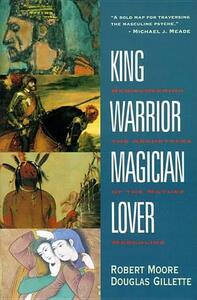Take a photo of a barcode or cover
95 reviews for:
King, Warrior, Magician, Lover: Rediscovering the Archetypes of the Mature Masculine
Douglas Gillette, Robert L. Moore
95 reviews for:
King, Warrior, Magician, Lover: Rediscovering the Archetypes of the Mature Masculine
Douglas Gillette, Robert L. Moore
reflective
slow-paced
challenging
slow-paced
This book is an interesting deconstruction of modern masculinity. I enjoyed the variety of stories, history, and psychology discussed. The themes were easy to follow and interesting too
This book starts off pretty rocky, and I was worried I've have to write another negative review. The beginning feels pretty wish-washy and vague, and fails to deliver a solid framework for the rest of the book. It's a lot of "do this, don't do that" that feels very self-help and beneath the aims of the book.
Nevertheless, the authors push on, and start to deliver the goods at around page 50. Moore and Gillette use a Jungian perspective to draw upon the stories and myths that have been taught to young men throughout human history to anchor and guide them in their lives. They identify a problem for males in our society, where opposing forces encourage us to be spineless and weak, or immature and reckless.
Neither extreme is for the well-centered man. Instead, to put it very simply, the heroes of the past fell into roughly four different archetypes that emphasized four different qualities: judgement, aggression, transformation, and affection. If a man fells off-centered, then he is failing to implement one of these qualities into his life.
Judgement: many of the heroes of myth were kings who were expected to rule justly or the kingdom around them would falter. So, too, must a person rule their own life.
Aggression: a person must defend himself, and aggressively pursue his goals or he will not be where he wants to be in life.
Transformation: the magicians of the past pursued knowledge, reaching a higher level mentally, and were able to use this knowledge to help others transform their own lives too.
Affection: tenderness from men is something that is discouraged by many in our society, but if we look back to the ancient cultures, many of the heroes were affectionate poets and tender lovers, shattering our modern manly stereotypes. Losing this means we lose an entire aspect of being human.
Some of it starts to sound pretty new-agey, and my description here is an oversimplification, but it was fascinating to read and think about, nonetheless.
Minus one star because of the rocky start, and I wish the authors pulled a bit more from myth, rather than modern self-help. Campbell's "The Power of Myth" has set the standard for this.
Nevertheless, the authors push on, and start to deliver the goods at around page 50. Moore and Gillette use a Jungian perspective to draw upon the stories and myths that have been taught to young men throughout human history to anchor and guide them in their lives. They identify a problem for males in our society, where opposing forces encourage us to be spineless and weak, or immature and reckless.
Neither extreme is for the well-centered man. Instead, to put it very simply, the heroes of the past fell into roughly four different archetypes that emphasized four different qualities: judgement, aggression, transformation, and affection. If a man fells off-centered, then he is failing to implement one of these qualities into his life.
Judgement: many of the heroes of myth were kings who were expected to rule justly or the kingdom around them would falter. So, too, must a person rule their own life.
Aggression: a person must defend himself, and aggressively pursue his goals or he will not be where he wants to be in life.
Transformation: the magicians of the past pursued knowledge, reaching a higher level mentally, and were able to use this knowledge to help others transform their own lives too.
Affection: tenderness from men is something that is discouraged by many in our society, but if we look back to the ancient cultures, many of the heroes were affectionate poets and tender lovers, shattering our modern manly stereotypes. Losing this means we lose an entire aspect of being human.
Some of it starts to sound pretty new-agey, and my description here is an oversimplification, but it was fascinating to read and think about, nonetheless.
Minus one star because of the rocky start, and I wish the authors pulled a bit more from myth, rather than modern self-help. Campbell's "The Power of Myth" has set the standard for this.
Trash. Full of magical thinking. They make up some vague characters, then go back in history to find people who fit the bill, sprinkle in some literal magic curses or blessings depending on how you behave. This book is a dated, self important, not-like-other-men mythological fan-fiction. These men are LARPing.
۲۵ شهریور ۱۴۰۳
این کتاب فوق العاده ست.
راجب ۴ آرکوتایپه که در رشد مردا تاثیر مهمی داره.
صوتیش سه ساعته.
این کتاب فوق العاده ست.
راجب ۴ آرکوتایپه که در رشد مردا تاثیر مهمی داره.
صوتیش سه ساعته.
Every boy who pretends to be a man must read this book. This book is still fresh and amazingly thought-provoking for men in general. The crises we see today in this world is just because men are not in the leadership role as they should be. One critical aspect of this book is that it is not well-structured and the language is too heavy for me in the beginning, and it took me some time to attune with it. Apart from this, i highly recommend this to everyone.
adventurous
informative
inspiring
informative
slow-paced
“steam train buffs have a sensuous, even erotic, affinity for these great, shining black ‘phalluses’”
informative
mysterious
reflective
medium-paced
informative
inspiring
reflective
fast-paced






